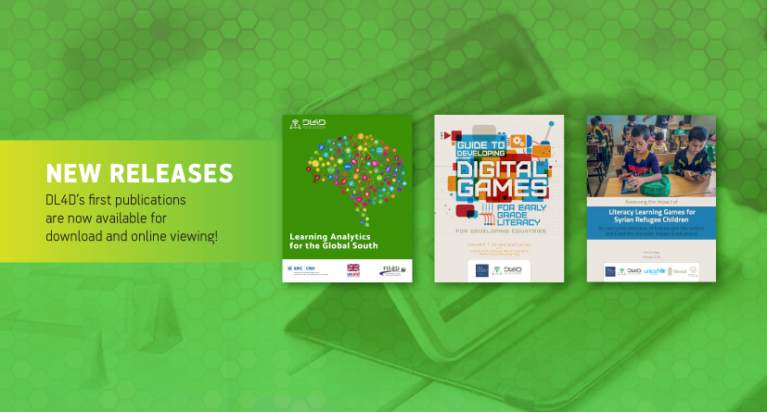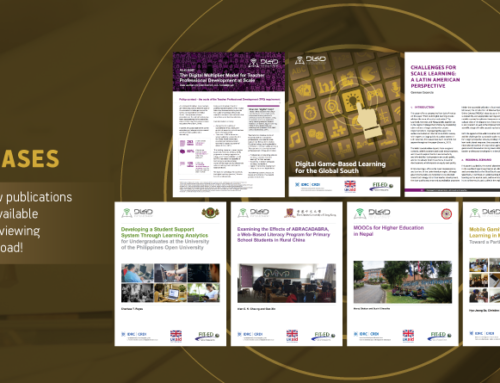NOW AVAILABLE – Read and download the first publications from DL4D: Learning Analytics for the Global South, Guide to Developing Digital Games for Early Grade Literacy for Developing Countries, and the impact and technical evaluations of two Arabic-language literacy learning digital games Antura and the Letters and Feed the Monster, winners of the EduApp4Syria Prize Competition.
Learning Analytics for the Global South is a compilation of papers that examine how the collection, analysis, and use of data about learners and their contexts have the potential to broaden access to quality education and improve the efficiency of educational processes and systems in developing countries around the world. In his discussion paper, Dragan Gašević of the University of Edinburgh Moray House School of Education and School of Informatics articulates these potentials and suggests how learning analytics could support critical digital learning and education imperatives such as quality learning at scale and the acquisition of 21st century skills. Experts from Africa (Paul Prinsloo of the University of South Africa), Mainland China (Bodong Chen of the University of Minnesota, USA and Yizhou Fan of Peking University, People’s Republic of China), Southeast Asia (Ma. Mercedes T. Rodrigo of the Ateneo de Manila University, Philippines), and Latin America (Cristóbal Cobo and Cecilia Aguerrebere, both of the Ceibal Foundation, Uruguay) situate Gašević’s proposals in their respective regional contexts.
Guide to Developing Digital Games for Early Grade Literacy for Developing Countries was commissioned jointly by DL4D and All Children Reading: A Grand Challenge for Development (ACR GCD) to assist game developers, literacy experts, and the staff of agencies interested in funding the development of digital games for early grade literacy learning. Authored by Kenneth Y. T. Lim (Research Scientist at Singapore’s National Institute of Education or NIE) and John Comings (ACR GCD’s Lead Early Grade Reading Senior Consultant), with Richard Lee, Ming De Yuen, Ahmed Hazyl Hilmy, Derek Chua, and Bing Heng Song (research assistants at the NIE), it presents information to be considered when designing games for literacy learning, uses game examples that demonstrate how game developers and literacy educators have worked together, and features 12 case studies of good practice games.
Antura and the Letters: Impact and Technical Evaluation and Feed the Monster: Impact and Technical Evaluation report the findings of a team of evaluators from Integrated Services, Indigenous Solutions (INTEGRATED) and the Consortium for Research and Evaluation of Advanced Technologies in Education (CREATE) of New York University led by Nedjma Koval-Saifi and Jan Plass. Co-funded by DL4D and ACR GCD, the impact evaluation used a longitudinal quasi-experimental design with control groups to estimate the impacts of the EduApp4Syria games on the literacy and psychosocial well-being of children with little to no schooling living in the Azraq refugee camp in Jordan. INTEGRATED and CREATE also conducted a technical evaluation to assess game use and engagement, refine key game evaluation questions, identify usability improvements, and provide feedback on the open beta versions of the games.
EduApp4Syria is a partnership between the Norwegian Agency for Development Cooperation (NORAD), ACR GCD, the Norwegian University of Science & Technology (NTNU), Orange, and the Inter-Agency Network for Education in Emergencies (INEE). The Prize Competition was funded by the Norwegian Government.







